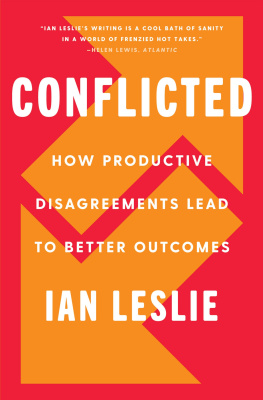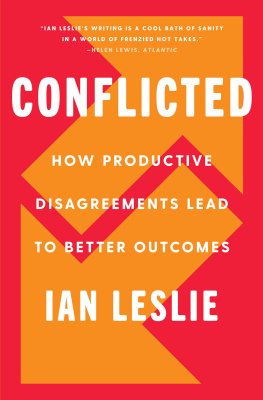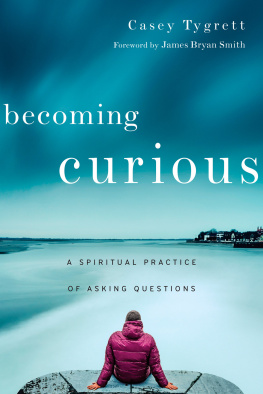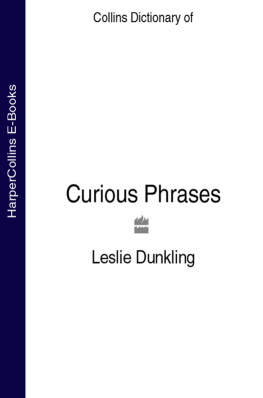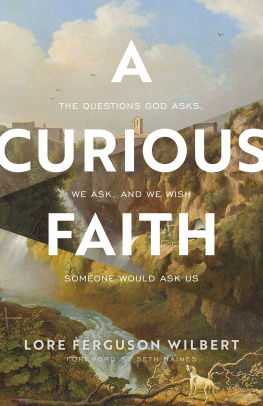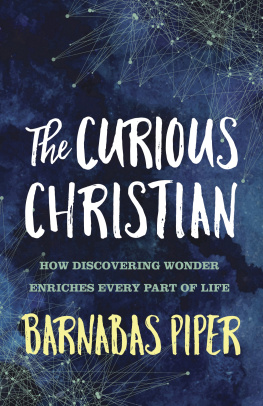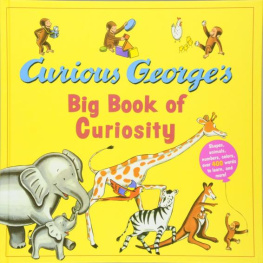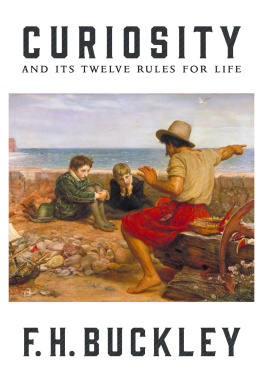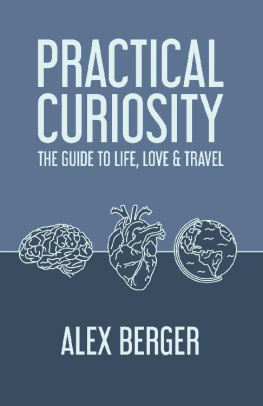MORE ADVANCE PRAISE FOR
Curious
David Ogilvy believed that the best advertising writers were marked out by an insatiable curiosity about every subject under the sun. Nowadays, as Ian Leslie has spotted, the same high level of curiosity is a requirement for progress in more and more jobs in business and government. In this excellent book Leslie explains why: the obvious ideas have mostly been done; what progress there is left now happens obliquely.
RORY SUTHERLAND, Vice Chairman of Ogilvy Group
In this important and hugely enjoyable book, Ian Leslie shows why its more important than ever that we find new ways to cultivate curiositybecause our careers, our happiness, and our childrens flourishing all depend upon it. Curious is, appropriately enough, a deeply fascinating exploration of the human capacity for being deeply fascinated, as well as a practical guide for becoming more curious yourself.
OLIVER BURKEMAN, author of The Antidote: Happiness for People Who Cant Stand Positive Thinking
Curiositythat elusive, mysterious stateseems always to slide away when writers attempt to dissect it. Ian Leslie not only offers a compelling analysis of how curiosity works, he tells us how to prompt it in our children, our employees, and ourselves. Both fascinating and eminently practical, Curious is a book to be relished.
DANIEL WILLINGHAM, professor of psychology at the University of Virginia


Copyright 2014 by Ian Leslie
Published by Basic Books,
A Member of the Perseus Books Group
All rights reserved. No part of this book may be reproduced in any manner whatsoever without written permission except in the case of brief quotations embodied in critical articles and reviews. For information, address Basic Books, 250 West 57th Street, 15th Floor, New York, NY 10107-1307.
Books published by Basic Books are available at special discounts for bulk purchases in the United States by corporations, institutions, and other organizations. For more information, please contact the Special Markets Department at the Perseus Books Group, 2300 Chestnut Street, Suite 200, Philadelphia, PA 19103, or call (800) 810-4145, ext. 5000, or e-mail .
Designed by Linda Mark
Library of Congress Cataloging-in-Publication Data
Leslie, Ian.
Curious : the desire to know and why your future depends on it / Ian Leslie.
pages cm
Includes bibliographical references and index.
ISBN 978-0-465-05694-1 (e-book) 1. Curiosity. I. Title.
BF323.C8L447 2014
153.8dc23
2014014708
10 9 8 7 6 5 4 3 2 1
For Io: may she never stop getting excited by what she doesnt yet know.
I have no special talents. I am only passionately curious.
ALBERT EINSTEIN
I mean that if it is important for us to eat first of all, it is even more important for us not to waste in the sole concern for eating our simple power of being hungry.
ANTONIN ARTAUD
Curiosity is insubordination in its purest form.
VLADIMIR NABOKOV
CONTENTS
T HE RESEARCHERS FIRST REALIZED THAT KANZI WAS AN unusually talented ape when they discovered that he had taught himself language. Sue Savage-Rumbaugh and her colleagues at the Language Research Center near Atlanta, Georgia, had devoted months of painstaking effort to teaching Kanzis adoptive mother, Matata, how to communicate using symbols. They worked with a keyboard that had lexigrams corresponding to things and actions in the real world; there was a key for apple, another one for play.
Despite being exceptionally intelligent, Matata made slow progress. She understood that the keyboard could be used to communicate, but the idea that specific symbols had specific significance eluded her. She would take Savage-Rumbaughs hand and lead her to the keyboard, intent on sharing what was on her mind. Then Matata would press any key and look up expectantly, as if Savage-Rumbaugh would surely know what she meant. She might press juice when what she really wanted was a banana, or groom when she wanted to go outdoors.
While the researchers were working with Matata, Kanzi was usually in the room, entertaining himself. It had been a condition of Kanzis transfer to the Language Center at six months old that he be allowed to remain with his mother while she participated in language studies. A hyperactive infant, Kanzi darted around the test room, jumping on his mothers head, pushing her hand away from the keyboard just as she was trying to hit a key, stealing the food she earned as a reward for good work.
The researchers had noticed that Kanzi also liked to play with the keyboard when it was free, but they thought little of it. Then one day, when he was two years old, Kanzi went up to the keyboard and very deliberately selected the chase key. He looked at Savage-Rumbaugh to see if she had seen what hed done. When she nodded and smiled, he ran off, looking behind him as he did so, a big, cheeky grin on his face.
That day, Kanzi used the keyboard 120 times, making requests for specific foods or games, or announcing what he was about to do. To the astonishment of Savage-Rumbaugh and her colleagues, it became clear that he had mastered the symbolic keyboard, despite having never been trained on it, or even seeming to have paid attention to his mothers lessons. Over the following months and years, the researchers turned their full attention to this ape prodigy. Kanzi went on to demonstrate linguistic aptitude of such sophistication that he changed the way cognitive psychologists thought about human learning and language.
The difference between an ape and a human being is less than you might think. Kanzi learned a vocabulary of more than two hundred words. When he was given tests of reading and communications skills, he matched, and in some respects exceeded, a child of two and a half years. He made up and follows his own rules of grammar, indicating a creative capacity. He understands spoken language and can follow spoken instructionswhen Savage-Rumbaugh told him to throw something into the river, he picked up a rock and hurled it in. He can use symbols to ask for treats or for help opening a door. He loves to play, and he loves to learn.
The story of Kanzi shows just how much we have in common with apes, which ought not to be a surprise, given that we share nearly all of their DNA. Yet it also suggests there is something that isnt sharedsomething very important.
What Kanzi never did, and never does, is ask why. He never furrows his brow, leans over the keyboard, and bashes out a sentence like, Why are you asking me all these questions? or What exactly are you trying to discover? He doesnt ask about what lies beyond the confines of his home at the research center. He can go to the refrigerator, but he has no interest in how the refrigerator works. Although he spends time with human beings who are clearly interested in what it is like to be an ape, Kanzi shows no curiosity about what its like to be a human. For that matter, he shows little curiosity in what it means to be an ape. He has never asked, Who am I?
WHO AM I? WAS THE QUESTION TO WHICH JOHN LLOYD AWOKE on the morning of Christmas Eve 1993. It didnt come to him in the form of a dreamy, philosophical rumination. It was urgent, painful, and insistent. It felt like a drill to the head.
Next page

